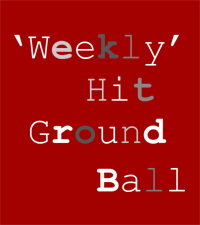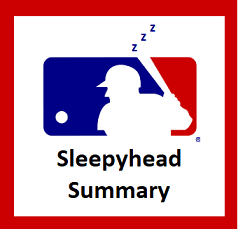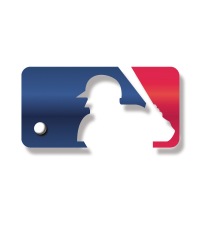 A new MLB season brings with it a plethora of firsts, but there’s none better than the first full Sunday of the regular season.
A new MLB season brings with it a plethora of firsts, but there’s none better than the first full Sunday of the regular season.
Every team is playing and all but the ESPN Sunday Night game (Giants – Dodgers tonight) are day-games for us to enjoy at a convenient time in the UK. The exception to that today is a Pirates-Tigers game being made up from yesterday’s postponement, yet that just means there’s an extra game to enjoy.
Throughout the season I write a regular Sunday morning column about the past week in MLB. I started it off in April 2007 and wouldn’t have imagined back then that I’d still be doing it eleven years later. I’ve changed the format around a bit over the years, but I’ve always liked the process of corralling my thoughts and picking out the key topics, or just the ones that caught my eye from the games I watched that week.
I’ll be continuing with that approach for the 2018 season, whilst adding in some regular blogs about the Oakland A’s campaign (which, based on last night, could be a long one).
Happ Happy, Jeter not so much
Like many of you, I settled down in front of the TV at 17.40 on Thursday eagerly awaiting the first game of the regular season between the Chicago Cubs and Miami Marlins. The Cubs’ lead-off hitter Ian Happ wasted no time in getting his season underway by launching the first pitch he saw into the stands for a home run.
I don’t know about the ESPN coverage, but the Cubs’ WGN-TV commentator Jim Deshaies called Happ’s shot and it seemed like the only person who didn’t think Happ would be wailing on the first pitch if it was close was the Marlins’ pitcher José Ureña.
Not a great pitch location on Ian Happ's lead off dinger… What a way to start a season. pic.twitter.com/dQQhrrbDZN
— Daren Willman (@darenw) March 29, 2018
Unsurprisingly the cameras immediately picked out new Marlins head honcho Derek Jeter (not AKA Mr Popular) watching from the stands. The good news for Jeter was that there was a decent crowd on hand – in Marlins terms – and they were in good spirits. The bad news was that most of those in attendance were Cubs fans on vacation.
The only positive for Jeter is that the Cubs fans presumably were less bothered about him than the fans of the next visitor to Marlins ballpark will be: the Boston Red Sox.
Extra thoughts on extra innings
Fears of a 0-162 season in Miami were instantly dispelled on Friday when the Marlins won the second game 2-1. The 17 inning marathon lasted 5 hours 18 minutes and after Miami levelled the scores at 1-1 in the bottom of the third inning, there were 13 and a half score-less frames until Miguel Rojas hit a walk-off single.
Coincidentally the day before this the Guardian had published an article about a brief period in the 1940s when some football competitions adopted a ‘play to a finish’ rule. “Nothing could be more absurd” was how the Guardian put it in 1946 in response to one game lasting nearly 400 minutes and the rule was shelved soon after.
The decision to introduce an extra-innings rule to Minor League baseball this year, with a runner being placed on second base to start each inning, did not go down well among many in the States, albeit with most seemingly oblivious (or not caring) that variations of the rule have been used in international competitions since 2008 and are already used in other leagues around the world (including the leading European leagues).
Outside of MLB, the only argument against some sort of extra inning rule is one governed by tradition as the impact on small playing staffs and other people that are employees or volunteers at the respective game is considerable. There’s more of an argument that the impact can be managed in MLB; the Cubs’ manager Joe Maddon made the sensible suggestion that teams should be able to call-up an extra reliever the day after, for example.
I don’t have a strong view against playing normal rules until you get a winner in MLB; however, I wouldn’t be surprised if some sort of rule is brought in within the next ten years to bring games to a swifter conclusion. How many people actually sat through every pitch of the additional eight innings that were served up on Friday? Very, very few is the likely answer.
Home runs and more home runs
MLB always does a good job with their Opening Day video package although this time around pitchers would have been given cause to moan even more than usual. Other than a couple of passing shots of hurlers, the video showed a succession of blasts by the likes of Aaron Judge, Giancarlo Stanton, Kris Bryant and more.
Coming after all the cricket kerfuffle around ball-tampering, it was almost as if MLB was trolling everyone whilst denying that the baseball has changed at all in recent seasons.
George Springer followed Ian Happ by launching his own lead-off home run on Opening Day, doing so for the second year running. WGN-TV’s Jim Deshaies didn’t just say Happ would hit the first home run of the season, he also predicted he would hit the last one in the World Series too. Keep a note of that if we end up with a Cubs-Astros World Series and have both Happ and Springer in with a chance of starting and ending the year on a home run.
Giancarlo Stanton waited for the second pitch he saw as a New York Yankee before depositing the ball over the fence. That was the first of two long-balls on his debut in pinstripes.
You’d expect such damage from Stanton, but not so much from the Chicago White Sox’s Matt Davidson. He immediately made anyone who drafted him in their fantasy team look clever by launching three home runs on Opening Day, with Chicago adding three more bombs to give the Kansas City Royals a pounding in Game One.
Nick Markakis launched a walk-off home run for Atlanta on Opening Day, as did former Orioles teammate Adam Jones. The latter plundered his round-tripper off new Minnesota Twins reliever Fernando Rodney. Rodney has continued to pick up saves in closer roles in recent years despite the analytics crowd telling you not to go near him with a bargepole.
He does tend to walk a tightrope in his appearance and the Twins got their first “Rodney, you plonker” experience out of the way early.
Pillar pilfers three bases
It’s not all about the longball though and the Blue Jays’ Kevin Pillar showed that brilliantly on Saturday by stealing second, third and home to beat the Yankees. That should have gone down well with the Blue Jays’ crowd at the MLB Meet Up in Leeds last night.
Leeds #MLBMeetupsUK up and running! @MLBUKCommunity @mlb_uk pic.twitter.com/egC7zYYO0S
— Blue Jays Fans UK ???? (@BlueJaysFansUK) March 31, 2018
The next one takes place tonight in London, so get down to Belushis’ in SH1 if you’re in the area.
Sunday Game To Watch
The MLB event in London was originally scheduled to show three games in Yankees vs Jays, Rays vs Red Sox and Astros vs Rangers, but they’ve added in the Angels vs A’s game too due to it being the pitching debut of Shohei Ohtani.
First pitch is scheduled for 21:05 BST. Naturally, this A’s fan hopes it’s a complete disaster for the Japanese newcomer as the A’s look to split the series 2-2.


